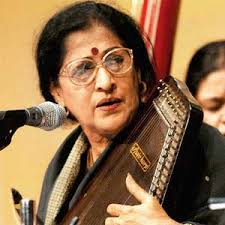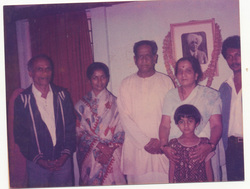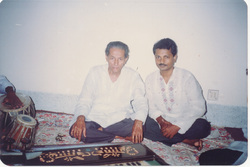
After completing Master of Music from MS University of Baroda I stared learning from Padmabibhushan Kishori Amonkar:
Kishori Amonkar, (born April 10, 1932, Bombay [now Mumbai], Maharashtra, India), Indian classical vocalist, recognized as one of the foremost singers in the Hindustani tradition and as an innovative exponent of the Jaipur gharana (community of musicians sharing a distinctive musical style). Amonkar’s mother was the well-known vocalist Mogubai Kurdikar, who trained under Alladiya Khan Saheb, the doyen of the Jaipur gharana. While learning the finer points and techniques of the Jaipur gharana from her mother, Amonkar also developed her own personal style, which reflects the influence of other gharanas and has generally been regarded as an individual variant of the Jaipur tradition.
Amonkar cultivated a deep understanding of her art, largely through extensive study of the ancient texts on music, and her repertoire was grand in its sweep. Although she was known
primarily for her skillful singing of classical khayal songs set in the traditional ragas (melodic frameworks) of Hindustani music, she also performed the lighter classical thumri repertoire, bhajan devotional songs, and film music. Regardless of musical genre, her performances
were marked by vitality and grace. Throughout her career, however, Amonkar was both criticized and praised for her bending of the Jaipur tradition. As she prioritized the expression of emotion in her music, she frequently departed from the gharana’s conventions of rhythm, ornamentation, and broader musical structure in order to intensify the music’s impact. Ultimately, she aimed to infuse the emotional appeal of the more popular styles into the comparatively rigid classical tradition. Aside from being a renowned musician, Amonkar was a popular speaker and traveled throughout India giving lectures, most notably on the theory of rasa (feelings, emotions) in music. In recognition of her contribution to the arts, she received many awards, including the Padma Bhushan (1987) and Padma Vibhushan (2002), two of the country’s top civilian honours. In 2010 she became a fellow of the Sangeet Natak Akademi (India’s national academy of music, arts, and dance), a lifetime appointment held by just a few dozen individuals at any given time.
Kishori Amonkar, (born April 10, 1932, Bombay [now Mumbai], Maharashtra, India), Indian classical vocalist, recognized as one of the foremost singers in the Hindustani tradition and as an innovative exponent of the Jaipur gharana (community of musicians sharing a distinctive musical style). Amonkar’s mother was the well-known vocalist Mogubai Kurdikar, who trained under Alladiya Khan Saheb, the doyen of the Jaipur gharana. While learning the finer points and techniques of the Jaipur gharana from her mother, Amonkar also developed her own personal style, which reflects the influence of other gharanas and has generally been regarded as an individual variant of the Jaipur tradition.
Amonkar cultivated a deep understanding of her art, largely through extensive study of the ancient texts on music, and her repertoire was grand in its sweep. Although she was known
primarily for her skillful singing of classical khayal songs set in the traditional ragas (melodic frameworks) of Hindustani music, she also performed the lighter classical thumri repertoire, bhajan devotional songs, and film music. Regardless of musical genre, her performances
were marked by vitality and grace. Throughout her career, however, Amonkar was both criticized and praised for her bending of the Jaipur tradition. As she prioritized the expression of emotion in her music, she frequently departed from the gharana’s conventions of rhythm, ornamentation, and broader musical structure in order to intensify the music’s impact. Ultimately, she aimed to infuse the emotional appeal of the more popular styles into the comparatively rigid classical tradition. Aside from being a renowned musician, Amonkar was a popular speaker and traveled throughout India giving lectures, most notably on the theory of rasa (feelings, emotions) in music. In recognition of her contribution to the arts, she received many awards, including the Padma Bhushan (1987) and Padma Vibhushan (2002), two of the country’s top civilian honours. In 2010 she became a fellow of the Sangeet Natak Akademi (India’s national academy of music, arts, and dance), a lifetime appointment held by just a few dozen individuals at any given time.

I (Aminul Haque -1st from right) started learning Pandit Laxmikant Bapat ( 1st from left) a devoted deciple of Pandit Bhim sen Joshi who was a teacher at Maharaja Sayajirao University of Baroda where Aminul was persuing his Bachelor and Masters in music.
Bhimsen Gururaj Joshi ( February 4, 1922 – January 24, 2011) He was an Indian
vocalist in the Hindustani classical tradition. He was born in Gadag, Karnataka to a Kannada Madhwa family He is known for the khayal form of singing, as well as for his popular renditions of devotional music (bhajans and abhangs).
In 1998, he was awarded the Sangeet Natak Akademi Fellowship the highest honour conferred by Sangeet Natak Akademi, India's National Academy for Music, Dance and
Drama. Subsequently received the Bharat Ratna, India's highest civilian honour, in 2008. Joshi heard a recording of Abdul Karim Khan's Thumri "Piya Bin Nahi Aavat Chain" in Raga Jhinjhoti when he was a child, which inspired him to become a musician. During this time, he also heard Pandit Sawai Gandharva at a performance in Kundgol. He traveled for three years around North India, including in Delhi, Kolkata, Gwalior, Lucknow and Rampur, trying to find a good guru. Eventually, his father succeeded in tracking him down in Jalandar and brought young Bhimsen back home. In 1936, Sawai Gandharva, a native of Dharwad, agreed to be his guru. Joshi stayed at his house in the guru-shishya (teacher-student) tradition. Joshi continued his training with Sawai Gandharva till 1940.
Bhimsen Gururaj Joshi ( February 4, 1922 – January 24, 2011) He was an Indian
vocalist in the Hindustani classical tradition. He was born in Gadag, Karnataka to a Kannada Madhwa family He is known for the khayal form of singing, as well as for his popular renditions of devotional music (bhajans and abhangs).
In 1998, he was awarded the Sangeet Natak Akademi Fellowship the highest honour conferred by Sangeet Natak Akademi, India's National Academy for Music, Dance and
Drama. Subsequently received the Bharat Ratna, India's highest civilian honour, in 2008. Joshi heard a recording of Abdul Karim Khan's Thumri "Piya Bin Nahi Aavat Chain" in Raga Jhinjhoti when he was a child, which inspired him to become a musician. During this time, he also heard Pandit Sawai Gandharva at a performance in Kundgol. He traveled for three years around North India, including in Delhi, Kolkata, Gwalior, Lucknow and Rampur, trying to find a good guru. Eventually, his father succeeded in tracking him down in Jalandar and brought young Bhimsen back home. In 1936, Sawai Gandharva, a native of Dharwad, agreed to be his guru. Joshi stayed at his house in the guru-shishya (teacher-student) tradition. Joshi continued his training with Sawai Gandharva till 1940.

Befor getting Indian Scholarship I was learning from Ustad Phool Mohammad Khan at Chayanot Music School. After coming back from Mumbai I was awarded Ford Foundation Scholarship for Mentor Fellowship under Ustad Phool Mohammad and started learning again from him.
Ustad Phool Mohammad Khan born on 31 December 1924 in Murshidabad , West Bengal in a religious but music lover family. He become a disciple of Ustad Mehdi Hossain Khan of Rampur Gharana in 1940 in Kolkata. He came into contact with National poet of Bangladesh Kazi Nazrul Islam for his talent in singing and started performing at Kolkata Radio at his early age. He continue learning from Ustad Latafat Hossain Khan when he settled in Dhaka. Being a great performer Ustad Phool Mohammad sacrifice his life in promoting and teaching Vocal Classical music in Bangladesh. He was a graduate and it was rare as a music teacher at that time. Ustad Phool Mohammad Khan not only teaches his disciples, he made number of music teachers and singers artist in Bangladesh like Shahnaz Rahmatullah, Anjuman Ara, Rebeka Sultana and more.
Ustad Phool Mohammad Khan born on 31 December 1924 in Murshidabad , West Bengal in a religious but music lover family. He become a disciple of Ustad Mehdi Hossain Khan of Rampur Gharana in 1940 in Kolkata. He came into contact with National poet of Bangladesh Kazi Nazrul Islam for his talent in singing and started performing at Kolkata Radio at his early age. He continue learning from Ustad Latafat Hossain Khan when he settled in Dhaka. Being a great performer Ustad Phool Mohammad sacrifice his life in promoting and teaching Vocal Classical music in Bangladesh. He was a graduate and it was rare as a music teacher at that time. Ustad Phool Mohammad Khan not only teaches his disciples, he made number of music teachers and singers artist in Bangladesh like Shahnaz Rahmatullah, Anjuman Ara, Rebeka Sultana and more.
